By Professor Marian Lyons (Department of History, Maynooth University) and Barbara McCormack (Special Collections Librarian, Maynooth University Library)
While Europe was in the throes of the Great War and Ireland made a bold strike for independence, the national seminary at Maynooth experienced a profound transformative period. On Easter Monday 1916, although the college president, J.F. Hogan, blessed seventeen Volunteers from the town of Maynooth as they set out to join the insurrection in Dublin, he stated categorically that he opposed their action. During Easter week there was an air of excitement in the college. When President Hogan rounded a corner to find students drilling in front of Rhetoric House, he allegedly said: ‘You’ll be well advised to disband, gentlemen’. From early on in the Great War, Maynooth priests volunteered for army chaplaincy duties. In 1917 the college authorities publicly supported the recruitment of Irish Catholic priests as army chaplains by conducting early ordinations to meet the demand for priests. But as Sinn Féin began to contest elections, and the days of the Irish Parliamentary Party grew numbered, the mood in Maynooth, as in the country, was changing.
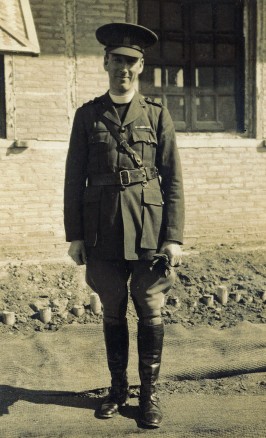
In early 1918 the British Army was in dire need of troops for the Western Front. To address this shortage, the Prime Minister David Lloyd George introduced a new Military Service Bill to extend conscription to Ireland. After the British government passed the bill, on 18 April 1918 a landmark meeting took place in Maynooth College at which leaders of all shades of nationalist opinion and members of the Irish Catholic hierarchy united in denouncing any attempt to enforce conscription in this country. College staff and students signed a pledge to protest the controversial measure. To safeguard against its enforcement and an anticipated general strike, ordinations were brought forward, students were dispatched home, and the college was closed.
Whereas providing pastoral care to Catholics on active service in the British Army in trenches as far apart as the Western Front and Mesopotamia was acceptable, forcing seminarians to take up arms was not. The exhibition ‘On Active Service’: Maynooth College, chaplains & the anti-conscription crisis’ which is running in the John Paul II Library at Maynooth University during National Heritage Week 2018 explores various stances assumed by Maynooth College staff and students in relation to military service during the Great War. What follows is a selection of items on display during this exhibition.
Army chaplaincy
Over fifty Maynooth graduates served as army chaplains in the First World War and many of these received the Military Cross. Their stories embody the complexities surrounding the Decade of Centenaries. Of those who ministered to Irish Catholics in the British Army during the Great War, the Tipperary Jesuit, Rev. Francis A. Gleeson, gave particularly outstanding service and left a wealth of poignant documentation relating to his ministry. A collection of notebooks, diaries and correspondence, which relates to Rev. Gleeson’s service with the Munster Fusiliers, is kindly on loan from the Dublin Diocesan Archives for this exhibition. In a novel collection of photographs, Rev. John F. Bowen from Dublin, who served in Mesopotamia during 1917-21, captured the exotic sites and faces that he encountered while on active service. Facsimiles of these photographs are also on display in the exhibition.
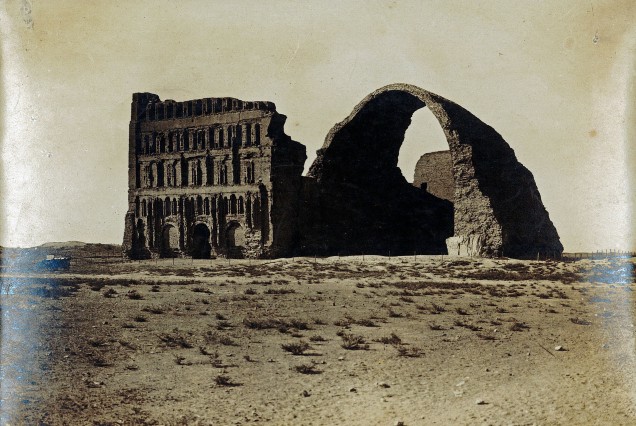
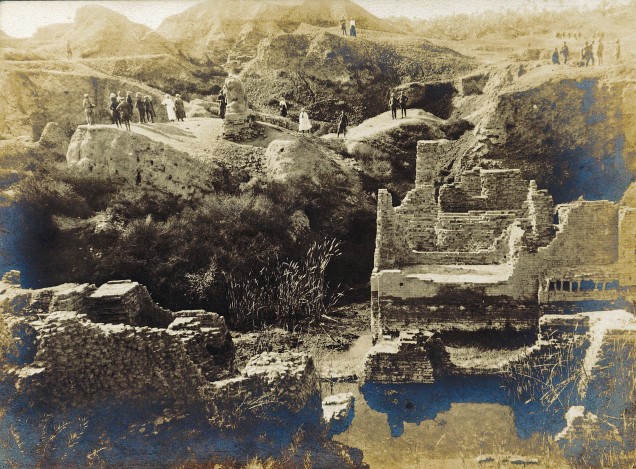
In February 1920 Bowen’s reporting officer described him as keen and energetic, noting that he was well regarded by the men. William Walsh, Archbishop of Dublin, approved a one-year extension to Rev. Bowen’s military service but he was demobilized on the 4 October 1921 and took up the role of officiating clergyman to Catholic troops on the S.S. Derbyshire. In the years after his return from service, Rev. Bowen ministered in the parishes of Monkstown and Inchicore and in the Asylum for the Blind, Dublin. He died in 1945.
Early closure of Maynooth College
In spring 1918 the British Army’s urgent need of troops for the Western Front prompted the British government to pass a new Military Service Bill extending conscription to Ireland. In response, on 18 April Cardinal Michael Logue called a special meeting of the Irish bishops at Maynooth College to consider what action the bishops should take. The first item under discussion was a recommendation from the Administrative Council of Maynooth College, through Vice-President James MacCaffrey, to disband the College. The reasons for this action were outlined as follows:
‘1. The students who are not in Holy Orders may be liable to conscription, and it is thought that the parents would be aggrieved if their sons were kept in College in a body where they could be easily apprehended by the emissaries of Conscription.
2. A Railway and Workmen’s strike is not impossible, and in such a contingency it would be most difficult, indeed practically impossible, to provision the College.’
(Minute book of the Episcopal Conference, Special General Meeting, 18 April 1918, p. 121).
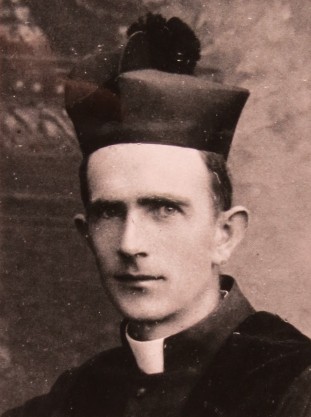
On that same day, after all nationalist political parties came together at the Mansion House Conference, Dublin and agreed to oppose conscription in Ireland, a delegation which included Éamon de Valera, John Dillon, William O’Brien and the Lord Mayor of Dublin, Laurence O’Neill, travelled to Maynooth where they met with the bishops who agreed to help organise the campaign of resistance. The bishops undertook to support the anti-conscription movement in three ways: a pledge to resist conscription would be made available outside Catholic churches on Sunday 21 April; a church gate collection for the Anti-conscription fund was authorised, with Laurence O’Neill and Archbishop William Walsh acting as trustees; and a public mass was to be celebrated.
An entry from the President’s Report for 1918 describes the impact of the Conscription Crisis on everyday life at the College. Vice-President James MacCaffrey states: ‘At a meeting of the Bishops, held in Maynooth on the 18th April, it was decided that, in view of the possibility of grave disturbance in the country and of the difficulty of providing for such a large community in case any general interruption of business should occur, all students might leave the College on the following day, except those who were called to Holy Orders.’
Staff and students of Maynooth College joined with churchgoers around Ireland on the 21 April in pledging their commitment to oppose conscription. A re-purposed old ledger was used to record the agreed declaration which was then signed by 279 men. As with other pledges around Ireland, it carried the resolution to resist compulsory service using the most effective means at the signatories’ disposal. The pledge was signed by the College President, Vice-President, Deans, Professors, Spiritual Directors and administrative staff, servants, kitchen staff and porters, and Third and Fourth Year Theology students.
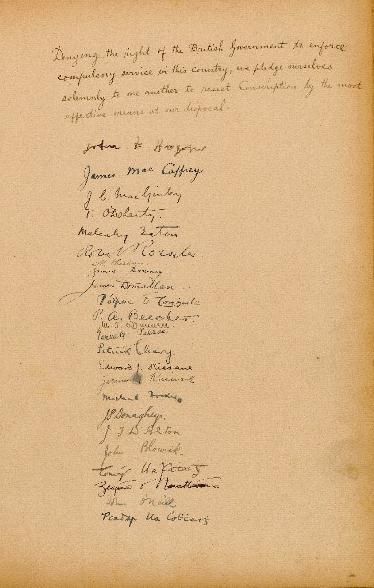
Reactions from staff – Rev. Peter Coffey (1876-1943)
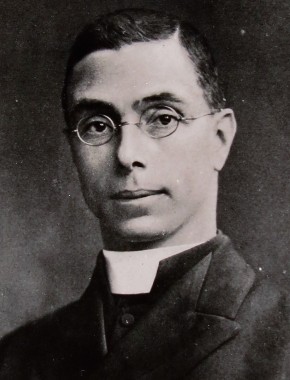
Among College staff who committed reflections on the Conscription crisis to print was Rev. Peter Coffey (1876–1943), priest and professor of philosophy at Maynooth College. An alumnus of St Patrick’s College, Maynooth, he was ordained a priest for Meath diocese in 1900. A nationalist in outlook, a strong supporter of the Irish language movement, and an adherent exponent of Christian socialism, Rev. Coffey wrote numerous earnest pamphlets and articles on social issues, some of which proved controversial with church authorities. However, his stance on Irish opposition to Conscription was at one with that of the Irish Roman Catholic hierarchy and leaders of all shades of Nationalist opinion. In his article titled ‘The conscription menace in Ireland and some issues raised by it’ published in the Irish Ecclesiastical Record, he applauded Irish resistance to British attempts to introduce conscription in Ireland on three grounds: first, conscription of Irish men was inhuman and oppressive; second no law passed the British Parliament was directly binding on Irishmen; and third, England never had any moral right to rule or govern Ireland.
Source: William Murphy, ‘Coffey, Peter’, in James McGuire and James Quinn (ed), Dictionary of Irish Biography. (Cambridge, 2009).
Reactions from staff – Rev. Walter McDonald (1854-1920)
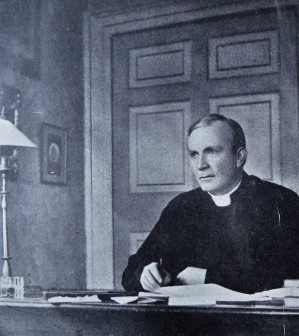
Born in Piltown, Co. Kilkenny, in 1854 and educated at St Kieran’s College in Kilkenny and later Maynooth College, Rev. McDonald was ordained at the age of twenty-two years. He taught philosophy, literature, and theology at St. Kieran’s College for five years and was appointed Professor of Theology in 1881, and in 1906 founded the Irish Theological Quarterly. Rev. McDonald was a Home Ruler and a strong supporter of the Irish Language movement, passionately arguing for its restoration.
McDonald’s controversial essay Some Ethical Questions of Peace and War was first published in 1919 after a general election in which many senior and junior members of the Irish Catholic clergy supported Sinn Féin. The arguments presented in Rev. McDonald’s essay did not make for comfortable reading at a time when the threat of Conscription had been successfully thwarted. He contended that Ireland was never a nation in its own right and was, therefore, obligated to shoulder military responsibilities with Great Britain. Referencing Rev. Coffey’s piece in the Irish Ecclesiastical Record, he noted that ‘the article was signed by a Professor in a seminary of which the Bishops of Ireland are Trustees’. This, he argued, signalled their support for, or at least tacit acceptance of, the sentiments expressed.
‘On Active Service’: Maynooth College, chaplains & the anti-conscription crisis will be on display in the John Paul II Library during National Heritage Week 2018 and will run until Monday, 3rd September.
Kindly supported by Maynooth University’s Commemoration Committee.